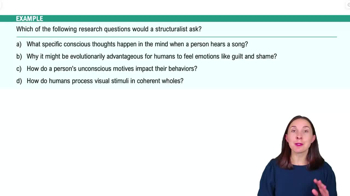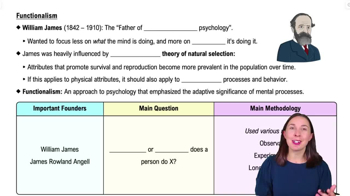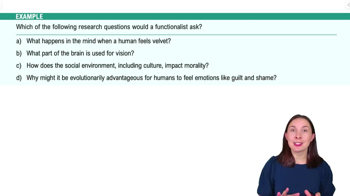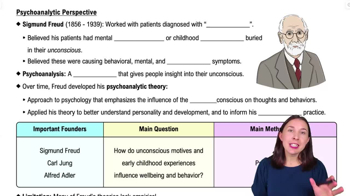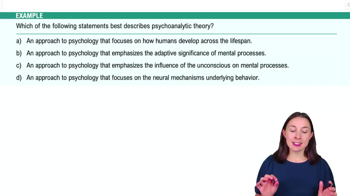Table of contents
- 1. Introduction to Psychology1h 43m
- 2. Psychology Research2h 20m
- 3. Biological Psychology2h 41m
- 4. Sensation and Perception28m
- 5. Consciousness and Sleep32m
- 6. Learning41m
- 7. Memory34m
- 8. Cognition37m
- 9. Emotion and Motivation35m
- 10. Developmental Psychology33m
- 11. Personality48m
- 12. Social Psychology41m
- 13. Stress and Health41m
- 14. Psychological Disorders44m
- 15. Treatment47m
1. Introduction to Psychology
Early Schools of Thought
Struggling with Psychology?
Join thousands of students who trust us to help them ace their exams!Watch the first videoMultiple Choice
Functionalism was heavily influenced by…
A
The idea of philosophical materialism.
B
Charles Darwin’s theory of natural selection.
C
John Locke’s theory that humans are born as blank slates.
D
Ivan Pavlov’s original experiments demonstrating classical conditioning in dogs.
 Verified step by step guidance
Verified step by step guidance1
Understand the context of Functionalism in psychology, which focuses on the purpose of consciousness and behavior.
Recognize that Functionalism was developed as a reaction to Structuralism, emphasizing the function of mental processes rather than their structure.
Identify the key influences on Functionalism, particularly the impact of evolutionary theory.
Consider Charles Darwin's theory of natural selection, which posits that traits that enhance survival and reproduction are more likely to be passed on to future generations.
Connect Darwin's theory to Functionalism, as it emphasizes the adaptive purpose of mental and behavioral processes, aligning with the idea that psychological traits have evolved to solve problems related to survival and reproduction.

 5:44m
5:44mWatch next
Master Structuralism with a bite sized video explanation from Hannah Gordils
Start learningRelated Videos
Related Practice



